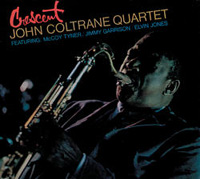 John Coltrane Crescent is comprised of material recorded by Coltrane's great quartet immediately prior to A Love Supreme, and gives few indications of where the music would be heading. In some ways it is the last "classic Coltrane" album, with A Love Supreme marking the turning point toward the later phase of Coltrane's career. The five songs that make up Crescent display much the same diversity and much the same intensity of the preceding albums by the quartet, programmed similarly to those albums, but showing an even deeper seriousness of intent. "Crescent" opens the album and is more or less the typical Coltrane Impulse! opener: slow-brewing, moody, with lits of cymbal rolls from Elvin Jones and rumbling rhythmic support from McCoy Tyner on piano. Coltrane plays tenor (throughout the album) and explores the tunes without getting too far into the brash honking that would characterize some of the later albums (that wasn't a criticism). "Wise One" actually prefigures later Alice Coltrane stuff, minus the harps and bells, beginning in a very spiritual, contemplative way and featuring some of Coltrane's smoothest playing. It's a great performance. The mood gives way to a cover of "Bessie's Blues," played as bright and swinging as hard as the quartet ever did. This is yet one more argument against the notion that Coltrane's Impulse! years were characterized by noisy "anti-jazz," because even in 1964 he was able to do a standard blues like this one in a straightforward way – and besides, Coltrane's playing was never all that pretty, as evidenced by the last like ten minutes of "My Favorite Things," a song that most people seem to think is very "cool" based on its first thirty seconds. "Bessie's Blues" is very simple, and Coltrane sticks to the melody, but it doesn't lose the basic feel of the classic quartet – everything these guys played sounds religious. "Lonnie's Lament" is a slow one, showcasing the whole band but McCoy Tyner in particular – a good cut to play for people who don't get why Tyner is so special. The man finds more ways to play within one chord than most people could find within a symphony of sound. (Sorry, I just wanted to work the phrase "symphony of sound" into this review somehow.) Jimmy Garrison takes a long bass solo that demonstrates his subtle mastery as well. For bass solos, it's hard to beat Garrison, who keeps you interested the whole way. It's not easy to keep people fixated on the bass but he almost makes you forget anyone else had been playing in the first place. Elvin doesn't solo here, as he gets the last track, "The Drum Thing," to really shine. Coltrane and Garrison state the theme, and then Elvin takes it and runs. Certainly one of the most exciting drum solos on record, in my opinion, continually keeping you guessing. Not exactly background music when dinner's on the table, but perfect when your head needs to be shaken up and rattled around to get out all the bad vibes. It's almost as though the quartet knew things were changing and wanted one last "traditional" jazz album before embarking on the journey. You get the blues, Coltrane playing basically straight, solo showcases, and recognizable meloly. By the end, though, it's clear you've been told something you won't understand for awhile. Crescent isn't my favorite of Coltrane's quartet albums, but it's a good one, and one I've appreciated more in light of the quartet box set, which positions it as more of a well-defined transitional session. In the context of the original albums, it does seem a bit more samey-sounding than albums like Coltrane and The John Coltrane Quartet Plays, but samey Coltrane is still mighty good music.
Review by Wimpempy Tarlisle |